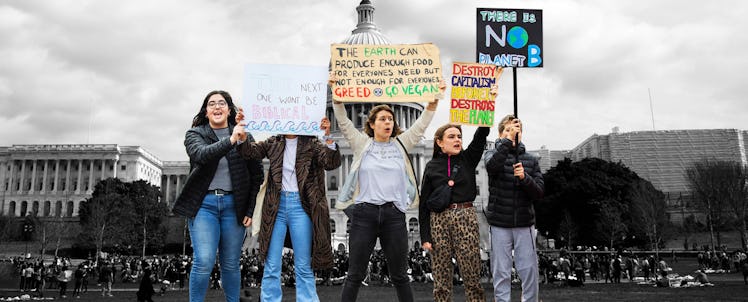Egg Boy Gets It: How Pissed Off Teens Became Our Moral Role Models
When adults don't get the job done, kids step up. It's happening all over the world.

Last Friday, tens of thousands of teenagers skipped school to protest government inaction on climate change and a teenage boy named William Connolly (also known as egg boy) in Australia smacked an egg against the back of the head of an Australian politician public entertaining the idea Muslims were responsible for their own slaughter at the hands of a white supremacist terrorist. These were just the latest teens to set a moral example, following hot on the heels of Ethan Lindenberger of Norwalk, Ohio, who testified before Congress about his parent’s anti-vaxxer beliefs and his desire to inoculate himself responsibly.
Zoom out a bit and you’ve got 16-year-old Greta Thunberg, nominated for a Nobel Peace Prize for her fight against climate change, 17-year-old Marcel McClinton, who survived a shooting in West Houston then decided to run for City Council, and TK. And there are the teenage survivors of the shooting at Marjory Stoneman Douglas High School, who formed the March For Our Lives movement and organized a protest so large it was seen around the world.
All over the country — or at least the internet — it seems like teenagers are speaking up. They are active, politically engaged, willing to share their opinions (good and bad) and organize. But why is it teenagers speaking out and not their parents? And why now? The issues they seem to be tackling, are at least on a surface level, myriad: gun violence, health care access, climate change, Islamophobia and racism. But there’s a common theme. Decisions are being passively made for teenagers by adults who refuse to act. This new crop of youthful activists isn’t anti-authority, per se, they stand against and step in for adult leaders too conflict averse to stand on principle.
Gun violence is the perfect example of this dynamic. School shootings have been a talked-about-problem since the Columbine massacre in 1999 and a significant percentage of the thousands of mass shootings that have occurred since have happened in schools. The kids who attend these schools make few of the decisions about how these institutions are run or guarded. They do not vote for their board members or representatives. They do not volunteer for the PTA because they are neither P nor T so don’t belong in the A.
But they do die. And, now, they also stand up and confront bad actors like the National Rifle Association and Floridian Republican Representative Matthew Gaetz, shaming them publicly. In a sense, they use their youth as a way to get close to power (just watch Egg Boy creep up on that bigot) and then offer profound, nuanced, and forceful critique. This seems to surprise people every time, but it’s unclear why. Today’s teenagers have been, thanks to their hovering parents and the hyper-competitiveness of the environment they’ve grown up in, very well educated.
Vaccines aren’t a dissimilar issue. When Ethan Lindenberger testified before Congress, it felt a bit like a punk move: He was dunking on his parents in front of the entire country. But he was actually respectful and well spoken about settled medical science. He was specific in his critique and did not give ground to Rand Paul’s libertarian diatribes. He demanded better and left.
In a sense, the broader trend of teen activism seems to take place in the context of climate change, which is not merely another issue. Teens have watched their parents’ generations fail to accomplish anything meaningful on the issue for, depending on their ages, the better part of two decades. What is left but to walk out of school and demand that there be something left of the broader world for when you arrive? As one 16-year-old student said to Wired: “My GPA isn’t going to matter if I’m dead.”
It’s not that adults are incapable of protest or enacting major change in their government. Many adult politicians have come up with radical and thoughtful policy ideas to tackle the existential threats of these issues. But it does seem that they are more entrenched in a system of party politics and politeness in a way that hapless and occasionally rude teenagers have not yet had to reckon with. Notably, teens are also not limited by the historical limits of party politics. Any old-timer who has been around for forty or fifty years knows what it’s like to weather many political storms. But for teenagers, who are incredibly present-oriented, there are only immediate problems and big solutions. Parents may constantly tell their teens to think outside of the box, but the truth is teens don’t have a box. They do, however, thanks largely to the internet, have a platform.
None of this is to say that all teenagers are good. Jacob Wohl rose to prominence as a teen business investor turned Trumpian conspiracy theorist and hack who recently made waves for faking a threat of murder and violence against himself. 4Chan, the notorious, more offensive, more gross precursor to Reddit, is filled with edgelord teens who are testing their boundaries and flirting with extreme humor that is often tied in with racism and misogyny. And teenagers don’t just protest school shootings, they perpetrate them. For all the same reasons that teenagers are poised to be activists and moral voices for a community that is failing to address a problem, they can also be toxic.
So what do we make of a kid who hits a bigot in the head with an egg? Is he on par with the teens who marched in Selma or the teens who sat in Wenceslas Square as the Soviet Union fell? Perhaps not. But that doesn’t mean egg boy isn’t worth hearing. He’s got a point to make. It’s the adults who have the egg on their face.
This article was originally published on